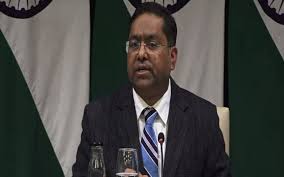MEA: Pakistan record on terror clear

New Delhi, June 13 — India has once again called out Pakistan’s role in cross-border terrorism, stating that the country’s record on terror is “clear and well established.” The Ministry of External Affairs (MEA) emphasized that Pakistan has consistently failed to take credible action against terror outfits that target India and destabilize the region.
MEA spokesperson Randhir Jaiswal made the remarks during a weekly press briefing in New Delhi. Responding to questions about Pakistan’s efforts against terrorism, Jaiswal said, “There is no ambiguity in Pakistan’s record. It is a matter of public and international record that it has provided shelter and support to various terror groups.”
Pakistan’s record on terror draws criticism
India has long maintained that Pakistan has allowed terror groups like Lashkar-e-Taiba, Jaish-e-Mohammed, and Hizbul Mujahideen to operate freely. These groups have been involved in several high-profile attacks in India, including the 2001 Parliament attack, the 2008 Mumbai attacks, and the 2019 Pulwama bombing.
“The masterminds of these attacks are still roaming freely in Pakistan. Some of them even enjoy state protection,” Jaiswal said. He further added that Pakistan’s attempt to present itself as a victim of terrorism cannot hide the fact that it has nurtured these groups for decades.
Global watchdogs have taken note
Although Pakistan was removed from the FATF grey list in October 2022, India remains skeptical. The MEA pointed out that the international watchdog may have accepted superficial compliance, but the ground reality hasn’t changed much.
“Temporary crackdowns or cosmetic trials will not fool the world,” said an Indian official who works closely with the country’s counter-terror policy. “We have seen this pattern before — arrests followed by quiet releases.”
India has consistently submitted dossiers and intelligence reports to international partners, including the United Nations, the United States, and the European Union, showing evidence of Pakistan’s complicity in terrorism.
International voices echo India’s concerns
India’s position is increasingly being recognized on the global stage. In its 2023 annual report, the U.S. Department of State listed Pakistan among countries that continue to serve as a base for terrorist activities. The report noted that while Pakistan has taken some actions, groups targeting India continue to operate without facing meaningful restrictions.
France and Germany have also supported India’s concerns at forums like the G20 and the United Nations Security Council. A French diplomat recently stated that “there can be no selective approach to terrorism,” in clear reference to Pakistan’s dual role of being both a self-proclaimed victim and an enabler of terror.
Terror and talks cannot go together
India has firmly stated that normal diplomatic ties with Pakistan will not resume until Islamabad takes verifiable steps to dismantle terror infrastructure. “We are always open to peaceful relations with our neighbors. But there can be no peace if cross-border terrorism continues,” said Jaiswal.
This position has remained consistent since 2019, when diplomatic relations were downgraded following the Pulwama terror attack. India carried out airstrikes in Balakot, targeting a training camp run by Jaish-e-Mohammed. Since then, bilateral relations have remained frozen.
Terror safe havens a threat to regional peace
Analysts say the presence of terror camps and safe havens in Pakistan is not just a concern for India, but for the entire South Asian region. Pakistan’s alleged support to extremist elements in Afghanistan and its interference in Kashmir have added to regional instability.
“Terror groups don’t recognize borders. Once they gain strength in one area, they spill over into others. That’s what we’ve seen in Afghanistan, Kashmir, and even parts of Balochistan,” said Col. R.S. Ghosh (Retd.), a defense expert based in New Delhi.
He emphasized that India’s firm diplomatic stance, backed by evidence, has played a crucial role in changing global perceptions about Pakistan’s involvement.
Pakistan’s response and denial
Pakistan has repeatedly denied India’s allegations and claims that it, too, has suffered from terrorism. Officials in Islamabad argue that thousands of Pakistani soldiers and civilians have died fighting terrorist groups.
However, India dismisses these claims as part of a narrative designed to divert global attention. “Being a victim does not absolve one from being a sponsor,” an Indian official said.
India has also pointed out that Pakistan has failed to take any significant action against UN-designated terrorists. Even when it arrests terror leaders, the process rarely results in real punishment or long-term dismantling of the networks they run.
The road ahead: India calls for global pressure
The MEA has called on the international community to maintain pressure on Pakistan. “Terrorism is a global threat. It must be countered with unified and sustained action,” Jaiswal said.
India continues to work with partners across the world to highlight the issue and push for stronger accountability. It has also stepped up its security measures at home, investing in counter-terror infrastructure, intelligence sharing, and cyber monitoring.
🟩 Final Thoughts
India’s message is clear: Pakistan’s record on terror is undeniable, and the time has come for the global community to act. As diplomatic efforts continue, New Delhi remains firm — there can be no progress in bilateral ties unless Pakistan takes real, irreversible steps to end its support for terrorism.






